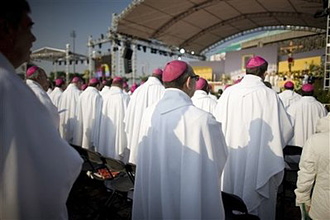
|  |  |  Editorials | Issues | January 2009 Editorials | Issues | January 2009  
Culture War Simmers in Mexico Over Permissive Laws on Family, Sexuality
 Oscar Avila - Chicago Tribune Oscar Avila - Chicago Tribune
go to original


| | Bishops gather to watch a video message of the Pope Benedict XVI in Mexico City, Sunday, Jan. 18, 2009. Benedict told the crowd that traditional families are an indispensable foundation for society and peoples. (AP/Alexandre Meneghini) |  |
Mexico City — Through speeches, prayer and music, conservative activists at a Vatican-organized conference have spent recent days making the case that the traditional family is in crisis. For evidence, participants say, just look outside the doors.

Mexico City's government, promoting one of the most liberal visions of the family and sexuality in Latin America and beyond, has enacted laws permitting early-term abortions, express divorces, same-sex civil unions and even free Viagra for seniors.

The measures have fueled a culture war in the middle of this traditionally Catholic country, and the activists say the Vatican conference has offered a chance to push back against policies they say undermine family values. The conference, organized at the Vatican's highest levels, runs through Sunday.

"As Catholics, we have a lot to do, working together, to change things," said Liliana Garcia, a leader of United Family, a group affiliated with Mexico's Catholic Church. "These elected officials have good intentions but are going about it the wrong way."

Aides to leftist Mexico City Mayor Marcelo Ebrard say his policies promote public health. Opinion polls show broad support for most of the measures in Mexico City, a metropolis more liberal than Mexico as a whole.

Throughout the week, dozens from the small leftist Social Democrat Party protested outside the Vatican conference site and engaged in a back-and-forth in the media with Mexico City Cardinal Norberto Rivera. The party's president, Jorge Carlos Diaz, said the gathering's traditional definition of a family "limits, discriminates against and excludes many other families."

The most controversial of Mexico City's new laws allows abortions for any reason within the first three months of pregnancy. Supporters say the law, enacted in 2007, protects mothers who previously had to pursue dangerous clandestine abortions.

Mexico City also is one of two jurisdictions in the country that allow same-sex civil unions. In addition, the city recently approved a drastic streamlining of the onerous divorce process.

The city has also promoted sex education for elementary school students and is steering preteen girls to get vaccines against the sexually transmitted human papillomavirus.

Amid this backdrop, Carlos Aguiar Retes, leader of Mexico's bishops, decried "adverse situations provoked by secularism and ethical relativism" including "civil laws contrary to marriage that threaten the future of our people."

In an address to the conference, Mexican President Felipe Calderon recalled the brothers and nuns who shaped his family's Catholic education, an unusually frank tribute in a country with typically rigid separation of politics and religion. Catholics make up a key base of Calderon's conservative National Action Party.

Gabriela Granados, a journalist who writes about sexuality in Mexico, said it is notable that both sides are bringing the values debate into the political realm.

"The country's leaders aren't only talking about sexuality as a moral subject," said Granados. "Now one can talk about sexuality in terms of the collective interest."

While less polarizing than debates over abortion and gay rights, Mexico City's initiative to combat erectile dysfunction has also grabbed headlines.

The city has opened three clinics specializing in the sexuality of seniors. Patients cleared by a doctor are eligible for free pills sold in the U.S. as Viagra and Levitra.

Dr. Iran Roldan, a geriatrician with the city's Department of Public Health, hopes her fellow citizens view the initiative as a matter of "quality of life," not as fodder for jokes or controversy.

"Sexuality is a universal subject. We are born with it, we grow up with it, we die with it," she said. "It's a touchy subject, not just in Mexico. We are providing an opportunity for people to talk about it openly." |

 |
|  |



